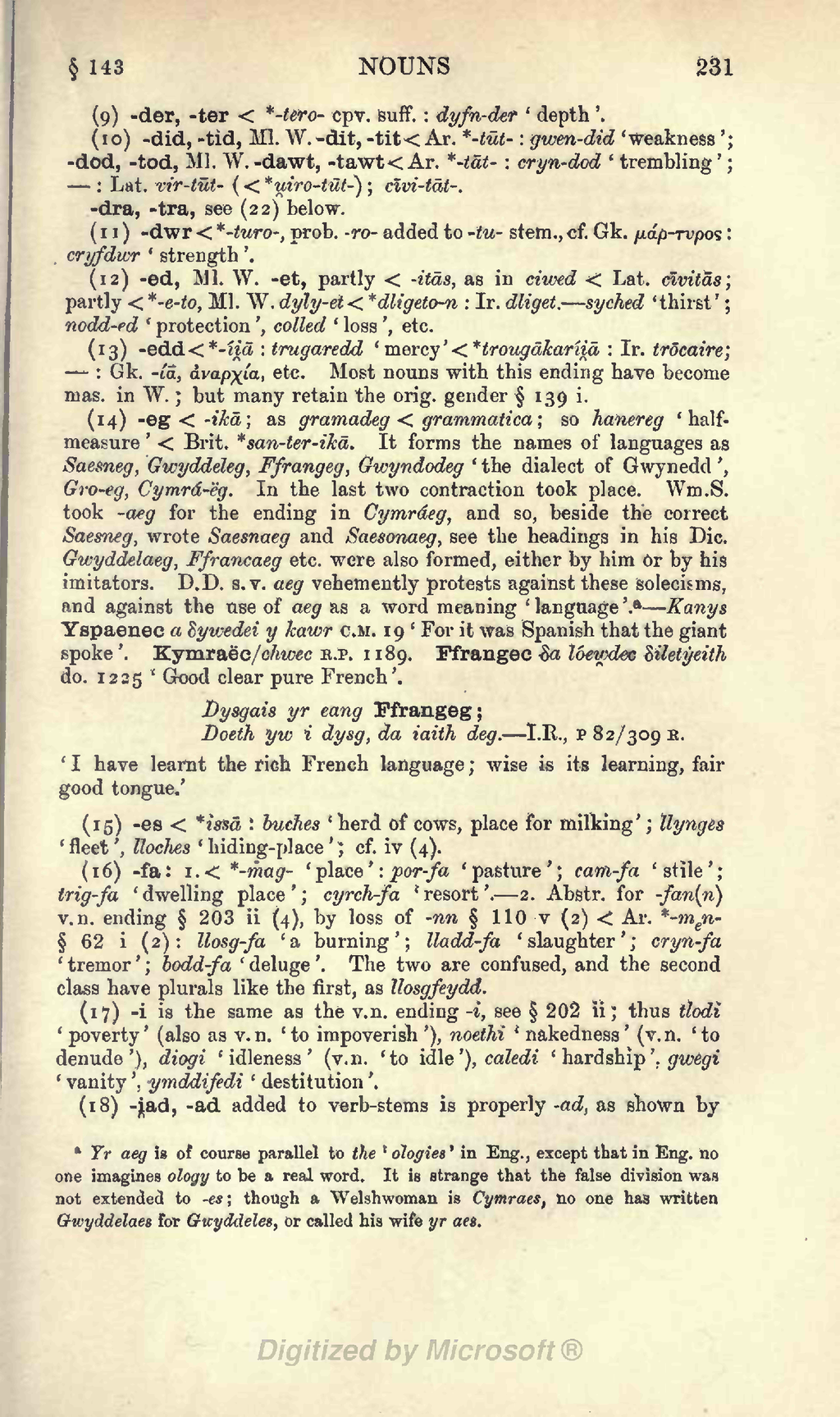(9) ‑der, ‑ter < *‑tero- cpv. suff.: dyfn-der ‘depth’.
(10) ‑did, ‑tid, Ml. W. ‑dit, ‑tit < Ar. *‑tūt‑: gwen-did ‘weakness’; ‑dod, ‑tod, Ml. W. ‑dawt, ‑tawt < Ar. *‑tāt‑: cryn-dod ‘trembling’;—: Lat. vir-tut- (< *u̯iro-tūt‑); cīvi-tāt‑.
‑dra, ‑tra, see (22) below.
(11) ‑dwr < *‑turo‑, prob. ‑ro- added to ‑tu- stem., cf. Gk. μάρ-τυρος: cryfdwr ‘strength’.
(12) ‑ed, Ml. W. ‑et, partly < ‑itās, as in ciwed < Lat. cīvitās; partly < *‑e‑to, Ml. W. dyly‑et < *dligeto‑n: Ir. dliget.—syched ‘thirst’; nodd-ed ‘protection’, colled ‘loss’, etc.
(13) ‑edd < *‑íi̯ā; trugaredd ‘mercy’ < *trougākaríi̯ā: Ir. trōcaire;—: Gk. ‑ίᾱ, ἀναρχία, etc. Most nouns with this ending have become mas. in W.; but many retain the orig. gender § 139 i.
(14) ‑eg < ‑ikā; as gramadeg < grammatica; so hanereg ‘half-measure’ < Brit. *san-ter-ikā. It forms the names of languages as Saesneg, Gwyddeleg, Ffrangeg, Gwyndodeg ‘the dialect of Gwynedd’, Gro-eg, Cymrá-ëg. In the last two contraction took place. Wm.S. took ‑aeg for the ending in Cymráeg, and so, beside the correct Saesneg, wrote Saesnaeg and Saesonaeg, see the headings in his Dic. Gwyddelaeg, Ffrancaeg etc. were also formed, either by him or by his imitators. D.D. s.v. aeg vehemently protests against these solecisms, and against the use of aeg as a word meaning ‘language’.[1]—Kanys Yspaenec a ẟywedei y kawr c.m. 19 ‘For it was Spanish that the giant spoke’. Kymraëc/chwec r.p. 1189. Ffrangec ẟa lóew̯dec ẟiletẏeith do. 1225 ‘Good clear pure French’.
- Dysgais yr eang Ffrangeg;
- Doeth yw i dysg, da iaith deg.—I.R., p 82/309 r.
‘I have learnt the rich French language; wise is its learning, fair good tongue.’
(15) ‑es < *issā: buches ‘herd of cows, place for milking’; llynges ‘fleet’, lloches ‘hiding-place’; cf. iv (4).
(16) ‑fa: 1. < *‑mag- ‘place’: por-fa ‘pasture’; cam-fa ‘stile’; trig-fa ‘dwelling place’; cyrch-fa ‘resort’.—2. Abstr. for ‑fan(n) v.n. ending § 203 ii (4), by loss of ‑nn § 110 v (2) < Ar. *‑mₑn- § 62 i (2): llosg-fa ‘a burning’; lladd-fa ‘slaughter’; cryn-fa ‘tremor’; bodd-fa ‘deluge’. The two are confused, and the second class have plurals like the first, as llosgfeydd.
(17) ‑i is the same as the v.n. ending ‑i, see § 202 ii; thus tlodi ‘poverty’ (also as v.n. ‘to impoverish’), noethi ‘nakedness’ (v.n. ‘to denude’), diogi ‘idleness’ (v.n. ‘to idle’), caledi ‘hardship’, gwegi ‘vanity’, ymddifedi ‘destitution’.
(18) ‑i̯ad, ‑ad added to verb-stems is properly ‑ad, as shown by- ↑ Yr aeg is of course parallel to the ‘ologies’ in Eng., except that in Eng. no one imagines ology to be a real word. It is strange that the false division was not extended to ‑es; though a Welshwoman is Cymraes, no one has written Gwyddelaes for Gwyddeles, or called his wife yr aes.
